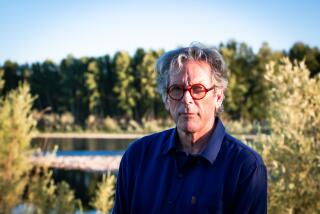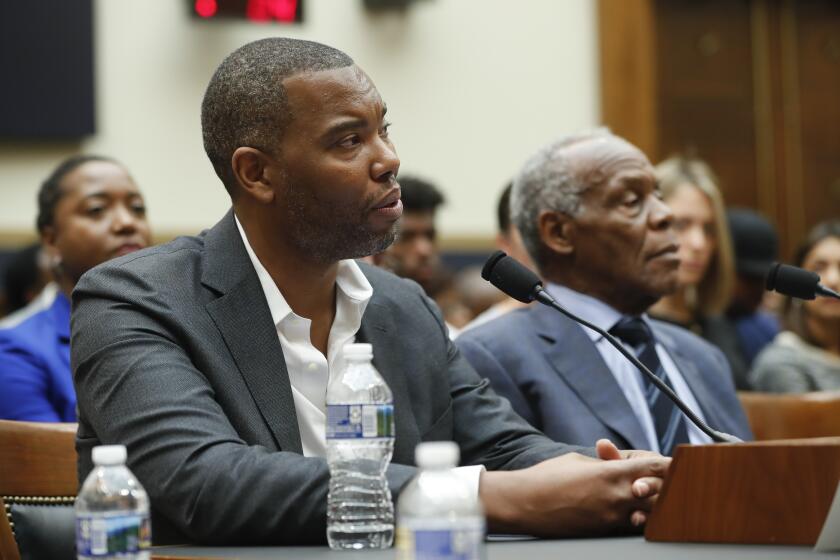The Musings of a Novelist in the Role of a Journalist : MAKING WAVES By Mario Vargas Llosa; Edited and translated from Spanish by John Ford; Farrar, Straus & Giroux; $27.50, 339 pages
You might think that authors who can make the prodigious effort of imagination, design and submersion required for a great novel--like deep-sea divers, they risk the bends--would have no trouble with a casual journalistic sketch. Not so. The sad law of writing decrees that it is only any good when it is the best the writer can manage.
Elmore Leonard is not Leo Tolstoy and Dave Barry is not Francois Rabelais, but the mistake is to think that a minor genre can succeed with minor commitment. What it takes is total commitment from a minor writer or--more rarely--a major writer’s total commitment to the minor work (John Updike doing book reviews). Opera singers occasionally indulge themselves into recording pop ballads or musical comedy songs. To reverse the talking-dog story: You are not surprised that they do it at all, but that they do it badly.
Mario Vargas Llosa is one of the important novelists of our times. Though for political and perhaps personal reasons, he and Gabriel Garcia Marquez are not on speaking terms, their novels are in a prickly dialogue. As Catholic-Protestant antiphony created the voice of Western Christendom, Garcia Marquez and Vargas Llosa have shaped the rich and vivid literary voice of Latin America. (The former would be the paradoxical Catholic, despite a mix of leftism and pantheism; the latter, the Protestant.)
“Making Waves” is a selection of journalistic sketches and essays written by Vargas Llosa over the past 35 years. Several represent a real engagement on the literary territory where his finest novels--”Conversations in the Cathedral,” “The War of the End of the World,” “The Real Life of Alejandro Mayta,” “The Storyteller”--have taken such risks.
Most are forgettable, though: pieces that do not stretch but curl up comfortably. They are examples of an occasion doing the work of the imagination. At times, the occasion seems to be no more than a desultory impulse by writer or editor.
There are a number of unfledged evocations of personalities he knew in Peru or in Paris, where he spent some of his early adult years. A sketch of the Paris pet cemetery is an easy walk taken for the sake of writing about it, and yields little, apart from one excellently Gallic epitaph: “Here lies the cat of the famous polemicist Henri Rochefort.” There are many such easy walks: a visit to Karl Marx’s house in London’s Soho, a recollection of Madrid in the 1950s, thoughts about Ernest Hemingway, William Faulkner and manifestations of American political correctness.
One or two walks are not in the least easy. After eight Peruvian journalists were killed by Indian peasants who mistook them for members of the violent Sendero Luminoso (Shining Path) guerrillas, Vargas Llosa was named to an investigating commission. The article he later wrote for the New York Times Magazine is not simply grueling reporting done with a novelist’s eye. It is a stunning foretaste of the mysterious upland world--alien to lowland ideologies of the right and left--that would be depicted in his novel “Death in the Andes.”
Sometimes the occasion for the occasional pieces is urgent, even if the pieces themselves are routine. A member of the Latin American literary left and a periodic visitor to Cuba, Vargas Llosa turned against Fidel Castro in 1968 for justifying the Soviet invasion of Czechoslovakia. He seemed to write in as much sorrow as anger.
In his fiction, on the other hand, and in a few of these pieces, his political convictions provide substance and energy, but--as was true of the similarly conservative and sometimes intemperate Feodor Dostoevsky--they display the truth-telling of the artist, not the pamphleteer.
More to Read
Sign up for our Book Club newsletter
Get the latest news, events and more from the Los Angeles Times Book Club, and help us get L.A. reading and talking.
You may occasionally receive promotional content from the Los Angeles Times.







